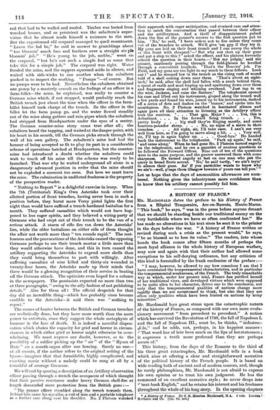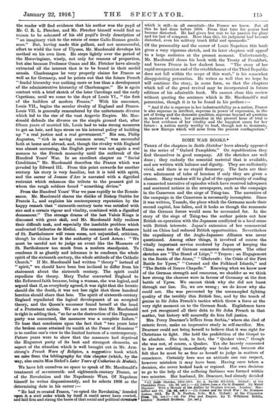A HISTORY OF FRANCE.*
Maccomar.o dates the preface to his History of France from a Hfipital Temporaire, Are-en-Barrois, Haute-Marne.
"This book," he says, " was in the press before anyone dreamt that we should be standing beside our traditional enemy on the very battlefields where we have so often confronted her." He
has made no alterations in his text since he sent it to the printer in the days before the war. " A history of France written or
revised during such a crisis as the present would," he says, " be so biassed as to lose its value." The readers, into whose hands the book comes after fifteen months of perhaps the most loyal affiance in the whole history of European warfare,
may now and again wish that their author had allowed some exceptions to his self-denying ordinance, but any criticism of this kind is forestalled by the frank confession of the preface :—
" I may, however, be allowed to say how conscious I am that I have overstated the temperamental characteristics, and in particular the temperamental weaknesses, of the French. The truly remarkable way in which, under her present trial, France has purified herself of her traditional vices, and developed virtues which were supposed to be quite alien to her character, drives one to the conclusion, not only that the temperamental qualities of nations change more rapidly than we are accustomed to think, but also that they are often only qualities which have been foisted on nations by noisy minorities."
Mr. Macdonald lays great stress upon the catastrophic nature• of the history of France, as compared with our own more evolu- tionary movement " from precedent to precedent." A nation which has survived the Revolution of 1789, the fall of Napoleon I.
and the fall of Napoleon III., must be, he thinks, " indestruc- tible," and he adds, not, perhaps, in his happiest manner : That word has of late been much on the lips of her statesmen ; it expresses a truth more profound than they are perhaps aware of."
This history, from the days of the Romans to the third of his three great catastrophes, Mr. Macdonald tells in a book which aims at offering a clear and straightforward narrative of the political history of the French people. It is based on wide reading both of ancient and of modern sources, and, though he rarely philosophizes, Mr. Macdonald is not afraid to express his own opinion or to trust his own judgment. He has the command of an excellent narrative style ; he never drops into i` text-book English," and he retains his interest and his freshness throughout the whole of his long story. In the opening chapters * A Hillary of France. By I. iterates Macdonald, Y.A. vols. Londe*: - M ethuen and Co. j22s. 6d. net.]
the reader will find evidence that his author was the pupil of Mr. C. R. L. Fletcher, and Mr. Fletcher himself would find no reason to be ashamed of his old pupil's lively description of " an imaginary visit to the estate of some Gallo-Roman gentle- man." But, having made this gallant, and not unsuccessful, effort to wield the bow of Ulysses, Mr. Macdonald develops his method on his own lines. He steps lightly over the period of the Merovingians, wisely, not only for reasons of proportion, but also because Professor Oman and Mr. Fletcher have already extracted all the interest that is to be found in their sordid annals. Charlemagne he very properly claims for France as well as for Germany, and he points out that the future French " feudal hierarchy was nothing more or less than a development of the administrative hierarchy of Charlemagne." He is again content with a brief sketch of the later Carolings and the early Capetians, until we come to the days of Louis VI., " the first of the builders of modern France." With his successor, Louis VII., begins the secular rivalry of England and France. Louis VII. is generally remembered by the unfortunate divorce which led to the rise of the vast Angevin Empire. Mr. Mac- donald defends the divorce on the simple ground that, after fifteen years of married life, Louis had to take strong measures to get an heir, and lays stress on his internal policy of building up " a real justice and a real government." His son, Philip Augustus, " rich in saving common sense," was successful both at home and abroad, and, though the rivalry with England was almost unceasing, the English power was not again a real menace to the French monarchy until the outbreak of the Hundred Years' War. In an excellent chapter on " Social Conditions," Mr. Macdonald describes the France which was invaded by Edward III. From this point onwards for another century his story is very familiar, but it is told with spirit, and the career of Jeanne d'Arc is narrated with a dignified restraint which enhances the tribute to the peasant girl in whom the rough soldiers found " something divine."
From the Hundred Years' War we pass rapidly to the Renais- sance. Mr. Macdonald shares the dislike of Bishop Stubbs for Francis I., and explains his contemporary reputation by the happy remark that " sixteenth-century taste was satisfied with size and a certain vigour and vitality, combined with a dignified demeanour." The strange drama of the last Valois Kings is discussed with great skill, and Mr. Macdonald fully realizes their difficult task, and especially the insoluble problem which confronted Catherine de Medici. His comment on the Massacre of St. Bartholomew will rouse some, not unjustified, criticism, though he claims for it the authority of Lord Acton : " We must be careful not to judge an event like the Massacre of St. Bartholomew too much from a modern standpoint. To condemn it as ghastly and inhuman is to condemn the whole spirit of the sixteenth century, the whole attitude of the Catholic Church." If Mr. Macdonald had written " theory " instead of " spirit," we should have been less inclined to differ from his statement about the sixteenth century. The spirit could repudiate the theory. Mary Tudor converted England to the Reformed faith because, being a woman, she was logical, and argued that if, as everybody agreed, it was right that the heretic should die the death, it was not less right that three hundred heretics should share that fate. The spirit of sixteenth-century England repudiated the logical development of an accepted theory, and the Queen's successor found herself at the head of a Protestant nation. We are not sure that Mr. Macdonald is right in adding that, " so far as the destruction of the Huguenot party was concerned, the massacre was a complete failure."
To base that conclusion upon the fact that " two years later the broken cause attained its zenith at the Peace of Monsieur " is to confine one's view to the limited horizon of a contemporary.
Future years were to show that the massacre had deprived the Huguenot party of its best and strongest elements, an aspect of the situation which is well brought out in Mr. Arm- strong's French Wars of Religion, a suggestive book which we miss from the bibliography for this chapter (which, by the way, also omits Miss Sichel's Later Years of Catherine de Medici).
We have left ourselves no space to speak of Mr. Macdonald's treatment of seventeenth- and eighteenth-century France, or of the Revolution and the Napoleonic Wars. Of Napoleon himself he writes dispassionately, and he selects 1808 as the determining date in his career :— " He had re-created France, ' co-opted the Revolution,' founded upon it a civil order which by itself it could never have erected, and laid firm and strong the bases of that social and political structure
which is still—in all essentials—the France we know. But all this he had done before 1808. From that time his genius had become distorted. Be had given free rein to his passion for glory and his lust of conquest. More than this, his judgment had become distorted, even his military touch fitful and spasmodic."
Of the personality and the career of Louis Napoleon this book gives a very vigorous sketch, and its later chapters will appeal to a large audience at the present moment. Unfortunately, Mr. Macdonald closes his book with the Treaty of Frankfort, and leaves France in her darkest hour. " The story of her rapid recuperation and of the establishment of the Third Republic does not fall within the scope of this work," is his somewhat disappointing peroration. Ho writes so well that we hope he will continue the story, in some form, so that the chapters which tell of the great revival may be incorporated in future editions of his admirable book. We cannot close this review without quoting the sentence which is Mr. Macdonald's real peroration, though it is to be found in his preface :-
" And if she is supreme in her indestructibility as a nation, France is also supreme in intellect, supreme in power of expression, in the art of living and the domestic qualities, supreme beyond all question in matters of taste ; her grandeur in the present hour of trial is the best evidence of her vitality and the happiest omen for her future : a nation surely worthy to lead, though not to dominate,
the new Europe which will arise from the present conflagration."



































 Previous page
Previous page